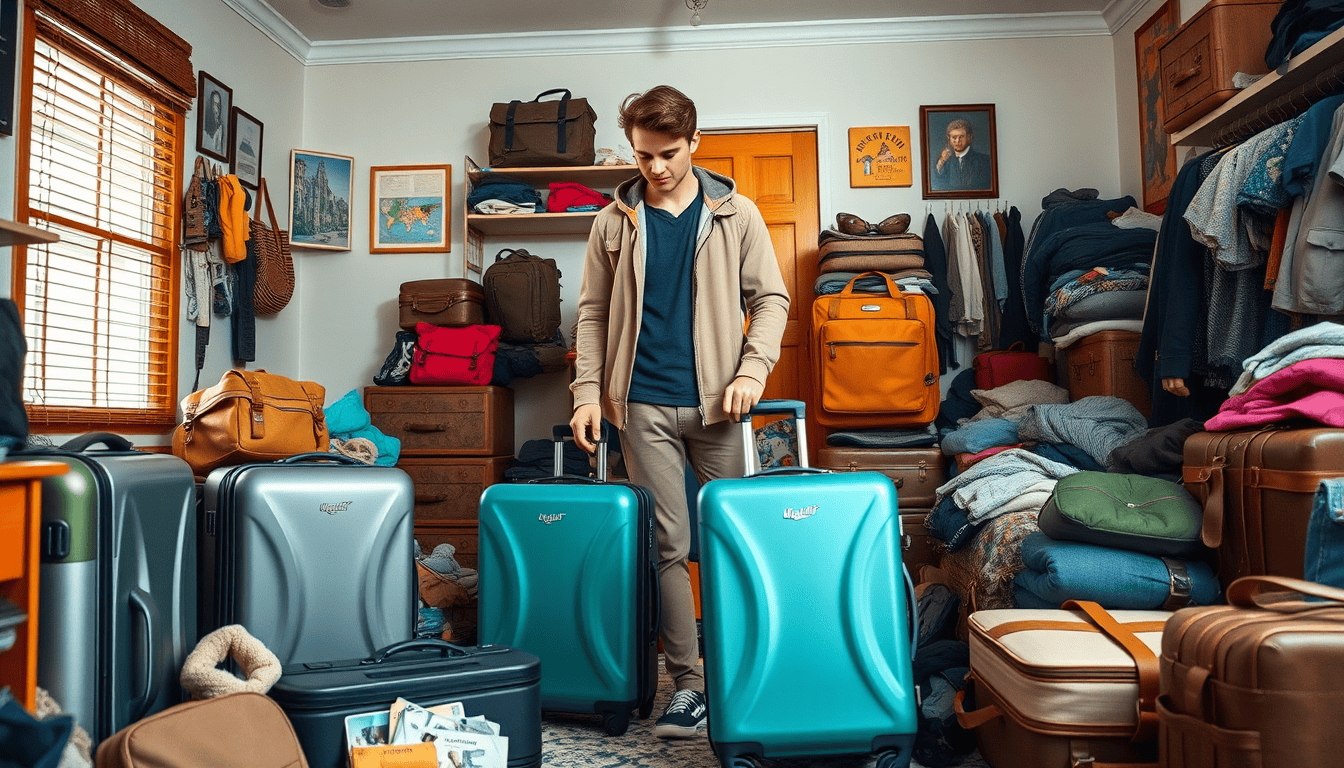
Packing for study abroad is an exciting yet challenging experience. You’re preparing for a whole new chapter in a new country, balancing practicality, comfort, and the excitement of exploring a new culture. Here’s a detailed packing guide to help you prepare for the journey, including essentials, pro tips, and ideas for staying organized.
1. Important Documents
The first and most crucial items on your list are documents you’ll need to access regularly. Make sure you have originals and digital or physical copies of all important documents to make your transition smoother.
- Passport and Visa: Essential for entry and exit. Make multiple copies and store them separately in case of loss or theft.
- Student ID and Acceptance Letter: Some countries require these at customs to confirm student status.
- Health Insurance Documentation: Many universities require proof of insurance, so bring your card and any necessary papers.
- Flight Information: Digital and hard copies of your tickets and itineraries.
- Local Emergency Contacts: A list of emergency contacts, both local and back home, in case your phone fails.
- Vaccination Records: Some countries require certain vaccinations, so bring proof.
- Bank Information: A copy of your credit card, bank contact info, and any other financial documents in case you face issues accessing funds.
2. Electronics and Gadgets
Electronics are key to staying connected, completing assignments, and staying entertained. Here’s what to consider:
- Laptop: Your primary tool for studying. Don’t forget a sturdy case or sleeve for protection.
- Phone and Charger: Essential for navigation, communication, and everything in between.
- Plug Adapters and Voltage Converters: Different countries have different outlets and voltages. Pack adapters and converters compatible with your destination.
- Portable Power Bank: To keep your devices charged on the go, especially useful during long days of travel.
- Headphones or Earbuds: For language learning, online classes, or simply listening to music.
- Portable Hard Drive or USB Stick: Extra storage for important documents or backup copies of your work.
- Camera (Optional): If you love photography, a separate camera can help capture memories with better quality.
3. Clothing Essentials
When it comes to clothes, packing depends on your destination's climate, cultural norms, and your study duration. Here are essentials to consider:
- Weather-Appropriate Basics: Research the climate and bring staple items like jeans, T-shirts, and sweaters that you can layer.
- Comfortable Walking Shoes: Essential for exploring and daily commute. One pair of versatile, comfortable shoes is a must.
- Jacket and Raincoat: Layering is crucial for unexpected weather, so a light waterproof jacket or raincoat is ideal.
- Professional Attire: If your program includes internships or networking events, pack one or two business-appropriate outfits.
- Cultural Considerations: Respect local customs, especially if conservative attire is expected. Research beforehand and pack accordingly.
- Swimwear (If Needed): For beach or pool visits. Choose one that you feel comfortable wearing in a foreign setting.
4. Toiletries and Personal Care
You might be able to buy toiletries at your destination, but some items may be more expensive or less familiar. Here’s what to pack:
- Travel-Sized Essentials: Bring basics like shampoo, conditioner, toothpaste, and a toothbrush. Opt for travel sizes to avoid weight.
- Prescription Medications: Bring enough to last your entire trip and keep a copy of the prescription.
- First-Aid Kit: Pack essentials like band-aids, pain relievers, and any personal medications.
- Reusable Toiletry Containers: Refillables can save space and help with environmental impact.
- Personal Hygiene Products: Feminine hygiene products, razors, and anything you might need in a pinch.
- Makeup and Skincare: Bring favorites, especially if they’re unique to your home country. Stick to a minimal set.
5. Academic Supplies
Most of your school supplies can likely be found abroad, but a few items from home may add comfort and ease to your studies:
- Notebooks and Pens: A small notebook for class notes or journaling. This can also help with language learning if your classes are in a new language.
- Planner: Staying organized is essential in a new environment, so bring a planner to keep track of deadlines and assignments.
- Calculator (If Needed): Specific calculators may be harder to find abroad, so bring one if your studies require it.
- Language Resources: A pocket dictionary, flashcards, or an app for easy translation, especially for students learning a new language.
6. Health and Safety Essentials
Prioritize items that will keep you safe and healthy:
- Reusable Water Bottle: Stay hydrated throughout the day and reduce plastic waste.
- Masks and Hand Sanitizer: Essential in post-COVID travel and crowded places.
- Mini First-Aid Kit: Pack basics like band-aids, pain relievers, and any personal medication.
- Personal Security Items: Some students carry doorstoppers for additional dorm security or an anti-theft backpack for commuting.
7. Money and Financial Planning
Navigating finances in a new country can be challenging. Here are items to help:
- Local Currency: Have a small amount of cash in the local currency for taxis, food, or emergencies upon arrival.
- Credit or Debit Card: Ensure your card is widely accepted and consider opening a local bank account if your stay is long-term.
- Currency Conversion App: These apps are useful for budgeting and understanding exchange rates in real-time.
8. Comfort Items from Home
Sometimes the little things from home make the biggest difference. Here are some items to make your new environment feel cozy:
- Photos of Family and Friends: Familiar faces can help with homesickness.
- Small Souvenirs or Gifts: Some small items to give new friends or hosts can be a great cultural exchange tool.
- Comfort Foods or Snacks: Bring a few of your favorite snacks that may be hard to find abroad.
- Reusable Tote Bag: Handy for grocery runs or quick trips.
9. Organizational Tools for Easy Packing
Staying organized while packing can be half the battle, so here are tools to make it easier:
- Packing Cubes: These help save space and keep things organized. You can organize cubes by category (clothes, toiletries, tech) to make unpacking simple.
- Compression Bags: Perfect for bulky items like jackets, these can reduce the amount of space clothing takes up in your luggage.
- Travel-Size Laundry Bag: A small laundry bag keeps dirty clothes separate and helps you stay on top of laundry.
Pro Tips for Packing Efficiently:
- Check Baggage Requirements: Double-check weight limits and dimensions for your airline to avoid unexpected fees.
- Roll Instead of Fold: Rolling clothes maximizes space and reduces wrinkles.
- Limit Shoes: Shoes are heavy and take up space, so choose versatile pairs that can serve multiple purposes.
- Label Electronics: Mark your chargers and gadgets, especially if sharing dorm space.
- Prioritize Essentials: Pack heavy or large items you can't get abroad, and leave things you can buy locally if you run out of room.
Final Thoughts
Remember that studying abroad is an adventure, and packing is just the beginning. Focus on essentials, bring a few items that feel like home, and keep an open mind. Enjoy the journey, make the most of every experience, and rest assured that you’re well-prepared for an incredible time abroad. Happy travels!




